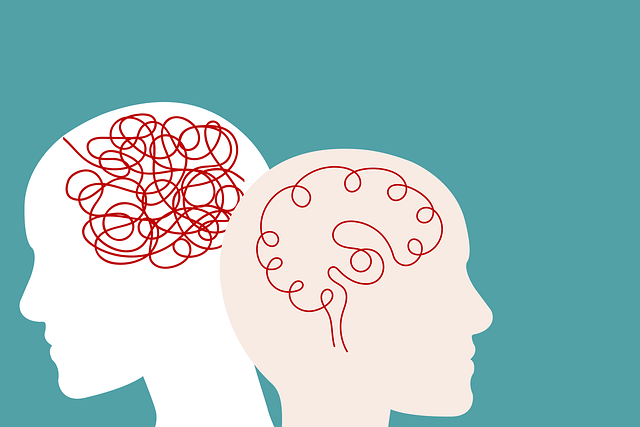Stress can significantly impact young minds, especially those with Attention Deficit Disorder (ADD) or Attention Deficit Hyperactivity Disorder (ADHD). Chronic stress can cause concentration issues, increased anxiety, and behavioral challenges. Compassion cultivation practices like mindfulness techniques have proven effective in building resilience and managing stress levels in children with ADD/ADHD. Cognitive Behavioral Therapy (CBT) and Mindfulness-Based Therapies are crucial tools for teaching emotional regulation and coping strategies. Integrating simple breathing exercises and guided visualizations into daily routines helps develop self-regulation skills. Public awareness campaigns and podcast series focused on mental health further support therapy for young children with ADD/ADHD, fostering a resilient environment that benefits academic success and overall development.
In today’s fast-paced world, stress management is crucial, especially for young minds. This article explores effective strategies to help children cope with stress, focusing on both therapeutic approaches and practical tools. We delve into the impact of stress on developing brains, its connection to Attention Deficit Disorder (ADD-ADHD), and successful case studies. By understanding these issues, parents and teachers can create supportive environments, offering therapy for young children with ADD-ADHD and fostering healthier, happier students. Discover evidence-based techniques tailored for classrooms and homes.
- Understanding Stress and Its Impact on Young Minds
- Identifying ADD-ADHD Symptoms and Their Relation to Stress
- Effective Therapy Approaches for Managing Stress in Children
- Practical Techniques: Tools for Teachers and Parents
- Case Studies: Success Stories of Stress Management Teaching
Understanding Stress and Its Impact on Young Minds

Stress is an inevitable part of life, but its impact on young minds can be profound, especially for those with attention-deficit/hyperactivity disorder (ADD-ADHD). Young children are still developing their coping mechanisms and emotional regulation skills, making them more susceptible to the adverse effects of chronic stress. This can lead to difficulties in concentration, increased anxiety, and even behavioral challenges at home and in the classroom.
Understanding these issues is crucial when designing mental health education programs or creating content like a mental wellness podcast series production. Compassion cultivation practices have been shown to be beneficial in helping children develop resilience. By teaching them mindfulness techniques and fostering an atmosphere of understanding and support, young individuals can learn to manage their stress levels more effectively. These strategies not only enhance their academic performance but also contribute to their overall well-being.
Identifying ADD-ADHD Symptoms and Their Relation to Stress

Children with Attention Deficit Disorder (ADD) or Attention-Deficit/Hyperactivity Disorder (ADHD) often present unique challenges when it comes to stress management. Recognizing and understanding these symptoms is a crucial step in teaching effective coping strategies. Many individuals with ADD/ADHD experience difficulty focusing, impulsive behavior, and heightened restlessness, which can significantly contribute to stress levels. These symptoms might manifest as anxiety or tantrums, especially in young children who are still developing their emotional regulation skills.
Incorporating therapy tailored for young children with ADD/ADHD can be transformative in building inner strength and promoting mental wellness. A structured approach, such as cognitive-behavioral therapy, can teach them to identify and manage stress triggers. Additionally, simple practices like Mental Wellness Journaling Exercises can empower kids to express their feelings and gain guidance on anxiety relief techniques. By combining therapy with these journaling exercises, children can learn to navigate their emotions more effectively, fostering a sense of calm and resilience in the face of stress.
Effective Therapy Approaches for Managing Stress in Children

Managing stress in children is a critical aspect of their overall well-being and development. For young individuals with conditions like ADD-ADHD, tailored therapy approaches play a pivotal role in coping strategies. Cognitive Behavioral Therapy (CBT) has proven to be an effective tool for emotional regulation among kids. This form of therapy helps them identify and change negative thought patterns, providing practical ways to manage stress and improve their mood. CBT encourages children to challenge unhelpful beliefs and replace them with more realistic, positive ones, fostering a sense of control over their emotions.
Additionally, Mindfulness-Based Therapies offer valuable communication strategies for both parents and educators to support young minds. By teaching mindfulness, these practices enhance emotional awareness, enabling children to understand and express their feelings effectively. This is especially beneficial for those with ADD-ADHD who may struggle with self-regulation. Through simple techniques like deep breathing exercises and meditation, kids can learn to stay calm under pressure, preventing burnout and promoting better stress management in the long term.
Practical Techniques: Tools for Teachers and Parents

Teaching stress management techniques can be a powerful tool for both teachers and parents looking to support young minds, especially those with Attention Deficit Disorder (ADD) or Attention Deficit Hyperactivity Disorder (ADHD). Practical strategies such as mindfulness meditation have gained significant attention in recent years due to their effectiveness in promoting emotional well-being. By integrating simple breathing exercises and guided visualizations into daily routines, educators and caregivers can help children develop essential self-regulation skills.
Beyond mindfulness, conflict resolution techniques offer another valuable asset. Public awareness campaigns focused on mental health have played a crucial role in normalizing conversations around stress and anxiety. Equipping young individuals with the ability to navigate interpersonal challenges constructively is not only beneficial for their academic success but also for their overall development. Teaching peaceful problem-solving methods can foster an environment of respect, understanding, and resilience, especially for children managing ADD/ADHD symptoms.
Case Studies: Success Stories of Stress Management Teaching

In the realm of stress management teaching, case studies offer powerful success stories that illustrate the transformative potential of various techniques. For instance, many young children diagnosed with Attention Deficit Disorder (ADD) or Attention Deficit Hyperactivity Disorder (ADHD) have found respite through tailored therapy programs. These interventions not only help them manage symptoms but also foster mental wellness. By combining cognitive-behavioral therapies with mindfulness exercises, educators and therapists have achieved remarkable results in reducing stress and enhancing overall well-being among these students. This is particularly significant given the ongoing efforts to dispel the stigma surrounding mental illness, as it showcases practical solutions that contribute to a healthier, more supportive learning environment.
Additionally, Mental Wellness Podcast Series Production has played a pivotal role in disseminating knowledge and promoting self-care. These podcasts often feature expert interviews, personal narratives, and practical tips, making complex concepts accessible to a wide audience. Similarly, the development of Mental Wellness Coaching Programs has equipped individuals with effective coping strategies, further supporting the integration of mental wellness into everyday life. Through these initiatives, communities are empowered to take proactive steps towards stress management, ensuring that everyone, regardless of age or background, has access to resources that promote mental health and reduce the impact of stressors.
Stress management techniques are invaluable tools for educators and parents navigating the challenges of ADD-ADHD in young minds. By understanding stress, identifying its triggers, and employing evidence-based therapy approaches, such as cognitive behavioral therapy, mindfulness practices, and structured routines, significant improvements in children’s emotional well-being can be achieved. The practical techniques discussed in this article empower teachers and parents to create supportive environments that foster resilience and promote healthy coping mechanisms in therapy for young children with ADD-ADHD. Through case studies highlighting success stories, it’s evident that integrating stress management teaching into daily routines can revolutionize the way we support these children, enabling them to thrive both academically and personally.











